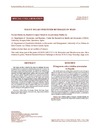Please use this identifier to cite or link to this item:
https://accedacris.ulpgc.es/jspui/handle/10553/19092
| Title: | El impuesto sobre bebidas azucaradas | Other Titles: | Tax on sugar sweetened beverages in Spain | Authors: | Ortún, Vicente González López-Valcárcel, Beatriz Pinilla Domínguez, Jaime |
UNESCO Clasification: | 3212 Salud pública 330918 Bebidas no alcohólicas |
Keywords: | Public policy Overweight Obesity Beverages Hyperglycemia, et al |
Issue Date: | 2016 | Project: | Economía de la Prevención y Estilos de Vida. de la Evidencia A Las Políticas | Journal: | Revista Española de Salud Pública | Abstract: | This article provides a critical review about the challenges that taxes on sugary drinks as an instrument of health policy must face to reverse the trend of the current epidemics of obesity. We analyzed the experiences of the leading countries, particularly Mexico, and reflect on the counterweight exerted by the industry against obesity policies, and on the power of lobb-yists. Those tax policies for public health have to overcome the enormous strength of the industry, which is exerted in several-science and research, brand reputation, influence on regulators-levels. We suggest that a specific tax on sugary drinks has enough potential to reduce noncommunicable di-seases and risk -diabetes mellitus, hypertriglyceridemia, lipoproteins, LDL, blood pressure- via reduced consumption thanks to the high price elasticity of those drinks. Furthermore, the effects are amplified even in the medium term, once established new habits to healthier eating. These taxes could en-courage business innovation without inflicting costs of lost jobs and contri-bute to reducing the social gradient in obesity. Este artículo aporta una revisión crítica acerca de los retos a los que se enfrentan los impuestos sobre las bebidas azucaradas como instrumento de políticas de salud, para revertir la tendencia epidémica de la obesidad. Se valoran las experiencias de los países más significados, en particular Méxi-co, y se reflexiona sobre el contrapeso que ejerce la industria a las políticas antiobesidad y el poder de los lobbies. Esas políticas impositivas en pro de la salud pública han de sobreponerse a la enorme fuerza de la industria, que es ejercida en varios niveles –ciencia e investigación, reputación de marca, influencia en reguladores–. Se sugiere que un impuesto específico sobre bebidas azucaradas tiene bastante potencial para reducir enfermedades no transmisibles y riesgos –diabetes mellitus, hipertrigliceridemia, lipoproteí-nas de baja densidad, hipetensión diastólica–, a través de la reducción del consumo, al ser alta la elasticidad del precio de estas bebidas. Además, los efectos incluso se amplifican a medio plazo, una vez establecidos nuevos hábitos de consumo más saludable. Los impuestos podrían fomentar la inno-vación empresarial sin infligir costes de pérdida de empleos y contribuirían a reducir el gradiente social de la obesidad. |
URI: | https://accedacris.ulpgc.es/handle/10553/19092 | ISSN: | 2173-9110 | Source: | Revista Española de Salud Pública [ISSN 2173-9110], v. 90, p. e1-e13 | Rights: | by-nc-nd |
| Appears in Collections: | Artículos |
SCOPUSTM
Citations
18
checked on Jun 8, 2025
WEB OF SCIENCETM
Citations
9
checked on May 2, 2021
Page view(s)
238
checked on Jan 15, 2026
Download(s)
336
checked on Jan 15, 2026
Google ScholarTM
Check
Share
Export metadata
Items in accedaCRIS are protected by copyright, with all rights reserved, unless otherwise indicated.
